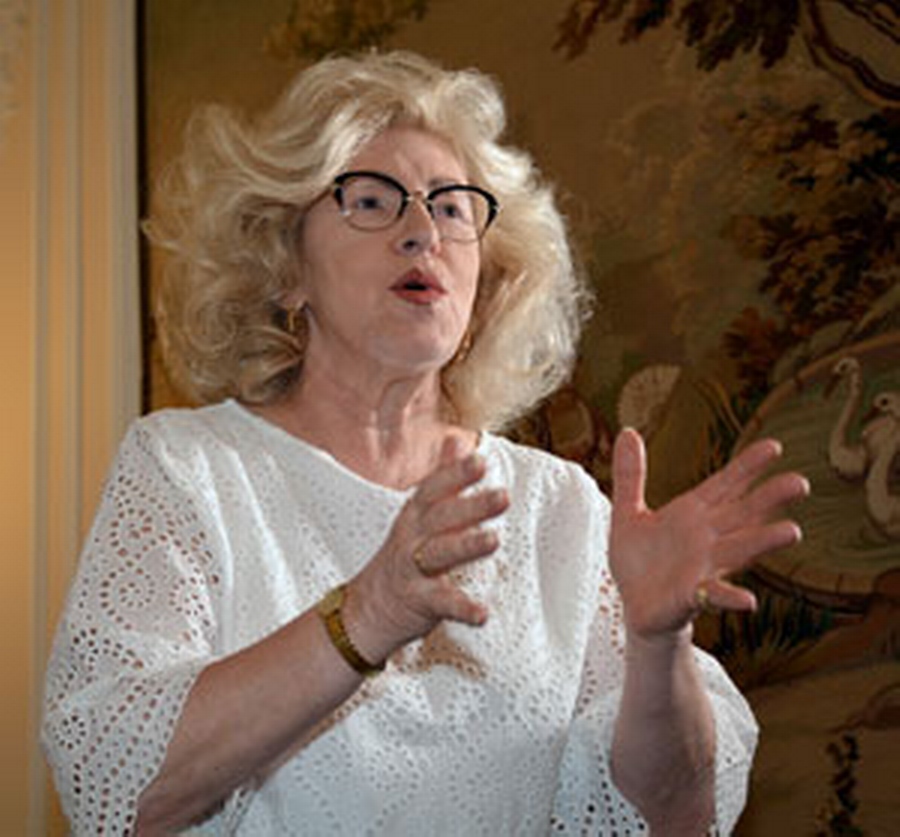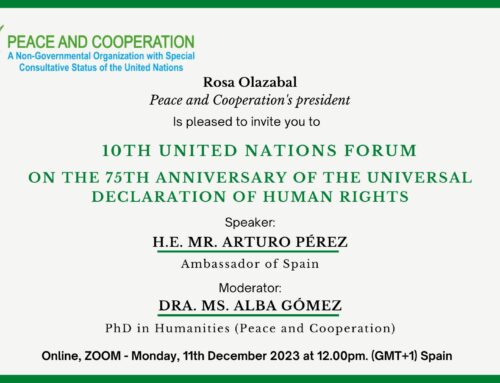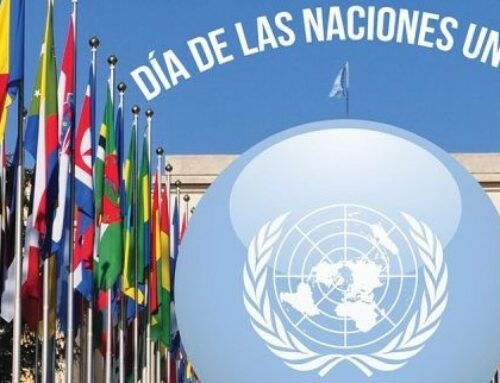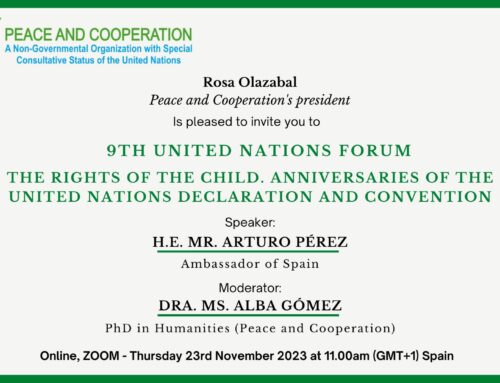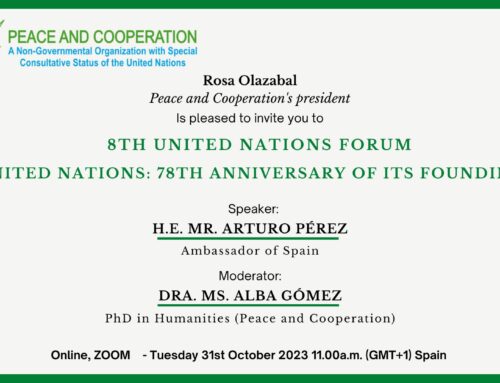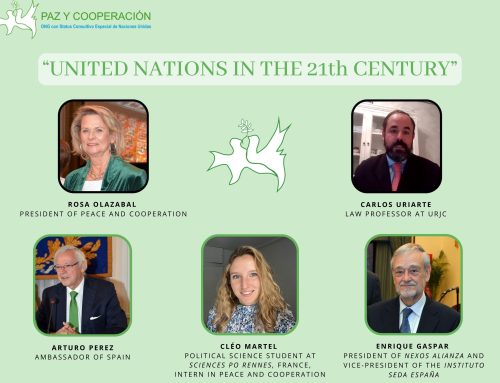On May 30th, the sixth conference of the United Nations forum series of lectures and debates about international themes took place at the Centro Riojano of Madrid, with the idea of dealing with and debating global problems, jointly organized by the Peace and Cooperation organization and the Centro Riojano of Madrid. In this case, it was lead by the H.E. Mrs. Marzenna Adamczyk, Ambassador of Poland, who addressed the topic of “Poland Today”.
The next conference, that will close the cycle of the first round of United Nations Forums, will take place on June 19th, imparted by his excellency Mr. Hong-jo Chun, Ambassador of the Republic of Korea. This conference will deal with the “sport for peace on the Korean Peninsula”. Without a doubt it is a excellent way to end the first United Nations Forum series, which brings global problems closer to our reality.
The conference began with the president of the Centro of Riojano of Madrid, José Antonio Rupérez, who introduced the Ambassador of Poland and the topic of discussion, stressing the importance of the United Nations Forum, that, together with the international tastings, both are events which give an international projection to the Centro Riojano of Madrid.
For his part, the founder of Peace and Cooperation, Joaquín Antuña, stressed the importance of the Forum, which is opened to the embassies and that it is a focus for the international politics that brings a different wind and a cosmopolitan flavor. In the same way, he affirmed to be a great admirer of Poland and the fight that this country has faced in order to obtain democracy, and he introduced the excellent Ambassador of Poland, who, apart from speaking a perfect Spanish, possessed a magnificent gift of words, as a good university professor.
Mrs. Marzenna Adamczyk got up to start the conference (admitting that her flaw was not being able to speak while sitting) and she was grateful for having organized such a magnificent event like this one. She divided her lecture into two parts, being one part more sentimental and the other part, more historical. To begin with, the Ambassador asked this question: What is Poland?
From there, she described details of the complexity of Poland, of the north coast, the south which is full of lakes almost virgin forests, the part of the Eastern Pomerania where the last piece of the European jungle exists and also where the last bisons bred in liberty live. Southwards, the majestic view of the mountains, which are not very high but they are characterized for being always in a green color all year round. Also, the Ambassador talked about the Polish cities Warsaw and Krakόw, which were destroyed by the Second World War. Mainly Warsaw, after rising up against Hitler in 1944, suffered one of the most overwhelming defeats that cost the lives of more than 250,000 people and city was bombed until there was nothing left.
The second part of the conference discussed the history of Poland. The Ambassador related to us how the first note wrote about the history of Poland was at the hands of a Spanish who made trips northwards in pursuit of salt and slaves. This Spaniard arrived at the beginning of the 9th century, describing it as a “good administrative state and with a king who was not at all obnoxious”. Poland little by little started to grow and in the 16th century there were already two empires in Europe, one being the Spanish and the other, the Polish. However, from the 17th century Poland ceased to exist as its own state and it disappeared from the map, divided among its three neighboring powers: Russia, Austria, and Prussia.
The Ambassador stressed the importance of the role that the church had in maintaining the Polish identity, where finally the Polish recovered their independence in the 20th century. It was in the year 1918 where the Polish regained their sovereignty, after more than 120 years of germanization and prussification. Nevertheless, this didn’t last long, just 20 years, given that in 1939 polish people were again attacked by Nazi Germany and, afterwards, by the East, by the Soviet Union.
The nightmare that the polish people suffered during the six years that the Second World War lasted, in which the country was destroyed and they lost the 25% of their population. To this is added the horrible experiences that happened, represented in concentration camps, like Auschwitz, built by Nazi Germany, where the “final solution” was executed.
Even so, the Ambassador remarked that Poland was the only country that did not have a collaborative government with Nazi State, but they had a government, an army and courts that operated in a parallel way and that they tried to maintain the moral of the Polish resistance. The concentration camps are without a doubt the necessary evidence of what humans are capable of doing to each other, and the necessity of knowing the history, as to not repeat it.
At the end of the war, the Polish decided to reconstruct Warsaw based on images, pictures, and souvenirs, and thanks to this, today, it is enrolled in the list of humanity’s heritage. But after the war, Poland stepped into the hands of the communist regime, which lasted 45 long years. This meant at an economic level, a total catastrophe. In 1953 they had the same GDP as Spain, but while Spain grew, Poland did nothing but decay. Food and commodities became rationed, agriculture was collectivized, and only little agriculture that left in the hands of individuals served to feed the population.
It was in the year 1980 when the the solidarity syndicate was founded, that, with the movement encouraged by the election of John Paul II as Pope had raised stir among the population, and the first rebellions and insurrections began to originate, which were crushed by the Communists. In 1989 the first free elections were held, once the Soviet Union and the Berlin Wall fell.
But as the Ambassador insisted, the strongest constraints are in the mentality, in that mentality marked by war and communism that did not led produce a big change in Poland. The Polish population had gone through a communism in which a protective state decided and thought for you, where everyone had work although salaries were very low as well as the standard of living. For this reason, she claimed that many people still thought “the life was better with communism”, a natural thought after the great shock that Poland suffered economically when the Soviet Union fell. Suddenly, there was a high unemployment and an extreme poverty which affected millions of people.
In contrast to today’s Poland, a country that is currently within NATO and the European Union, where there is little unemployment, only 4%, and a 5% economic growth rate. Although the Ambassador revealed that to match the rest of the European Union countries, the pace of development would have to be 12%, and, therefore, there is still a large gap to be recovered.
At the end of the conference, a turn of questions was opened that dealt with the European secularization and the importance of religion in Poland, the results of the European elections or the path of Santiago from Poland, questions that the Ambassador answered without difficulty and giving her own opinion.
The conference ended, emphasizing Poland’s lack of sovereignty throughout its history, which it recovered in the 20th century, but lost 20 years later, due to Nazi Germany and the Soviet Union. That is why Poland is very wary of its sovereignty that has been so hard to achieve.
Without a doubt, the Conference on “Poland Today” in charge of Mrs. Marzenna Adamczyk was interesting and of great relevance, and we, the attendees, were able to enjoy a great speaker and an excellent lecturer who left us all undoubtedly enthralled.

